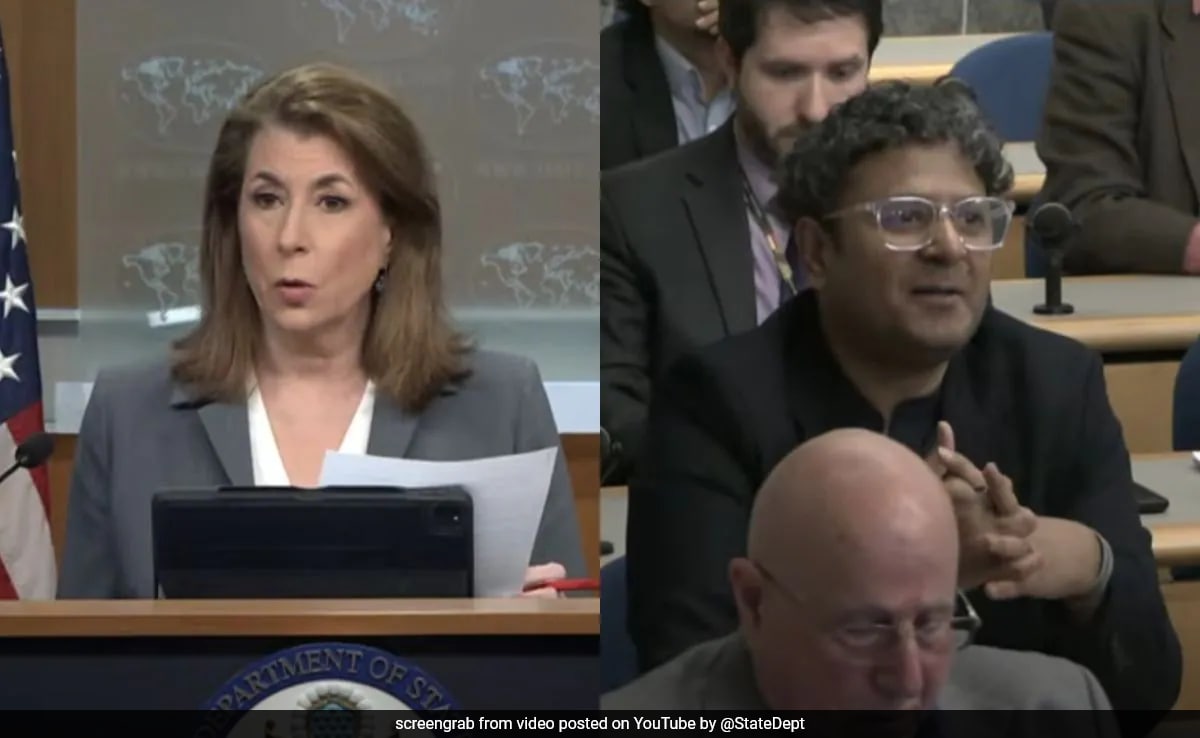US Shuns Pak Journalist's Kashmir Question: A Deep Dive into Geopolitical Tensions
Meta Description: The US State Department's response to a Pakistani journalist's question on Kashmir sparks controversy, highlighting the complex geopolitical dynamics and the ongoing dispute between India and Pakistan. This in-depth analysis explores the implications of this incident and the broader context of US foreign policy in South Asia.
Keywords: Kashmir, Pakistan, India, US foreign policy, South Asia, Geopolitics, US State Department, Pakistani journalist, Indo-Pak relations, Kashmir conflict, dispute, international relations.
The recent snub by the US State Department of a Pakistani journalist's question regarding the Kashmir dispute has ignited a firestorm of debate, underscoring the delicate and highly sensitive nature of this long-standing conflict. The incident, seemingly a minor diplomatic oversight, reveals a deeper layer of geopolitical complexities and the intricate balancing act the United States undertakes in its South Asian foreign policy. This in-depth analysis will examine the incident, its implications, and the broader context within which it occurred.
The Incident: A Simple Question, a Complex Response
The incident unfolded during a press briefing at the US State Department. A Pakistani journalist, whose name has been widely circulated in various news outlets but will be withheld here to respect potential privacy concerns, posed a straightforward question regarding the US government's position on the ongoing situation in Kashmir. The question, while framed differently depending on the source reporting, essentially sought clarification on the US stance concerning human rights and self-determination in the disputed territory.
Instead of providing a direct and substantive answer, the spokesperson for the State Department either deflected the question, offered a vague response, or outright ignored it. This perceived disregard, reported by various news agencies including The Hindu, Dawn, and Al Jazeera, has been interpreted by many as a deliberate avoidance of a contentious issue, highlighting the US's cautious approach to navigating the fraught relationship between India and Pakistan.
The Geopolitical Landscape: A Tightrope Walk for the US
The Kashmir dispute is a deeply entrenched territorial conflict between India and Pakistan, dating back to the partition of British India in 1947. Both countries claim the entire region of Kashmir, leading to several wars and ongoing military tension. The issue is further complicated by the presence of various militant groups and a significant humanitarian crisis.
The United States, maintaining close strategic partnerships with both India and Pakistan, finds itself in a challenging position. India is a major trading partner and a key player in the Indo-Pacific region, while Pakistan plays a crucial role in counterterrorism efforts and regional stability. Any statement perceived as favoring one side over the other can have significant repercussions, potentially damaging valuable diplomatic ties.
This explains the cautious, often ambiguous, approach adopted by the US State Department when addressing Kashmir. While the US consistently emphasizes the importance of resolving the conflict through dialogue and peaceful means, it generally refrains from explicitly taking sides or issuing statements that could be interpreted as interference in India's internal affairs. This delicate balancing act is crucial to maintaining a productive relationship with both nations.
The Human Rights Dimension: A Silent Struggle
The Kashmir dispute is not solely a territorial conflict; it’s also deeply rooted in human rights concerns. Reports from various human rights organizations, including Amnesty International and Human Rights Watch, have documented instances of human rights violations in the region. These violations include restrictions on freedom of speech, arbitrary arrests, and allegations of extrajudicial killings. The lack of independent investigation and accountability further exacerbates the situation.
The Pakistani journalist's question likely alluded to these human rights concerns, prompting the US State Department's apparent reticence. Addressing these concerns openly could strain the US-India relationship, given India's sensitivity to external criticism on its internal matters. This highlights the complex interplay between geopolitical considerations and human rights advocacy in international relations.
Implications and Analysis: A Deeper Look into US Foreign Policy
The US State Department's handling of the Pakistani journalist's question raises several important questions regarding US foreign policy priorities in South Asia:
-
Prioritizing strategic partnerships over human rights: Does the US prioritize its strategic relationship with India over the human rights situation in Kashmir? Critics argue that this incident exemplifies a prioritization of strategic interests over human rights concerns.
-
The limits of soft power diplomacy: The response demonstrates the limitations of “soft power” diplomacy when confronted with highly sensitive geopolitical issues. The avoidance of a direct answer suggests a lack of effective communication strategies to address complex and sensitive issues without compromising vital relationships.
-
The need for nuanced communication: The incident underscores the need for more nuanced and context-specific communication strategies when dealing with issues as sensitive as Kashmir. A more transparent and sensitive approach, acknowledging the concerns while also emphasizing the importance of bilateral dialogue, could have been more effective.
Conclusion: Navigating a Complex Geopolitical Minefield
The US State Department's response to the Pakistani journalist's question on Kashmir is more than just a single incident; it's a microcosm of the complex and multifaceted challenges facing US foreign policy in South Asia. Balancing strategic interests with human rights concerns, navigating the sensitivities of a long-standing territorial dispute, and maintaining constructive relationships with both India and Pakistan requires a nuanced and strategic approach. The incident serves as a stark reminder of the difficulties involved and the need for a more proactive and transparent engagement with the Kashmir issue, striking a balance between protecting vital relationships and upholding international human rights standards. Further research and analysis are needed to fully understand the long-term implications of this incident and its potential impact on US relations with both India and Pakistan.
Call to Action: Share your thoughts on this complex issue in the comments section below. What strategies do you believe the US should adopt to navigate this challenging geopolitical landscape while upholding its commitment to human rights? Let's spark a constructive dialogue.

